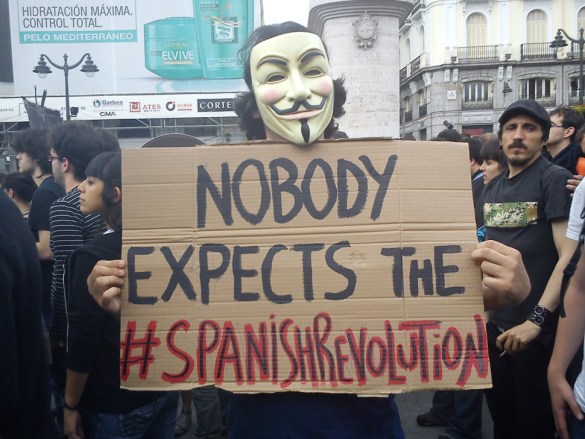Portugal on the verge of a general Strike
October 1, 2012
By LUIS MIRANDA | THE REAL AGENDA | OCTOBER 1, 2012
The people of Portugal and Greece have added their anger to that of the Spanish neighbors, putting more pressure on politicians and bureaucrats who are slowly but surely signing their countries away to the European bankers.
The mos recent call for a general strike was made by CGTP, one of the most important Portuguese unions. The reason was the same as the historic and massive rally two weeks ago: protest against cuts and extreme austerity the Portuguese government adopted and will continue to impose as it approves the budget for the rest of the year and also for 2013.
Thousands of Portuguese met yesterday in the central and emblematic Terreiro do Paco, in the heart of Lisbon, to try to pressure the government led by conservative leader Passos Coelho. After a massive demonstration on September 15, the Portuguese prime minister backed down and withdrew a controversial measure to lower wages to all Portuguese. But now, the new budget proposed by the government contain cuts and tax increases that will make life even more difficult for the Portuguese people.
Arménio Carlos, secretary general of the CGTP, told the crowd that he expected all of the attendants to help him make the government change its plan, because this time “the people will be heard” and the government will have to listen “either the good way or the hard way.” He announced that he will discuss with his union ca all for a general strike, which is more than likely to happen.
However, according to local press, the influx of people was less than two weeks ago, when they were summoned by group of civil society organizations with no political affiliation. Then, a huge crowd packed not only Lisbon but a dozen Portuguese cities in a protest that had not been seen in Lisbon since the Claveles Revolution.
But, according to Carlos — who incidentally wore a symbolic red carnation ( clavel) in his shirt — things are not going to end well. “We are ready to channel the flow of the protest. We must end this government before this government ends the country. “
Attendees included officials who recounted how their life has changed since they stopped receiving payment for overtime (now the Government will provide that starting January), due in part to the rise in VAT taxes. From the hundreds of thousands of protesters, many are unemployed in Portugal, a country that had never unemployment levels get to as high as 15%.
During the last protest, people held signs with the same messages that have been seen in every single march in Portugal for the last few weeks; with messages such as “thieves”, referring to Portuguese politicians and more directly to government officials who continue to lose popularity as fast as the days go by.
Several leaders of Portuguese left-wing groups asked the Prime Minister, Passos Coelho, to listen to the people, to change his policies. The expectation as to what will Coelho do is growing on the streets of Portugal; mainly in the capital city of Lisbon. Coelho will present next week some relevant details of the Portuguese budget for 2013, which is expected to be very tight with the intention to reduce the difference between government income and its spending. As it happened in Spain, Greece and Italy, the cuts announced by the Prime Minister will mean less investment in welfare programs.
The Real Agenda encourages the sharing of its original content ONLY through the use of the tools provided at the bottom of every article. Please DON’T copy articles from The Real Agenda and redistribute by email or post to the web, unless you request and receive written permission to do so. If permission is granted, you must publish the article EXACTLY as it appears on The Real Agenda.
